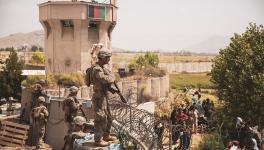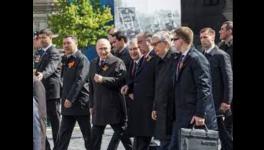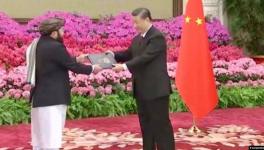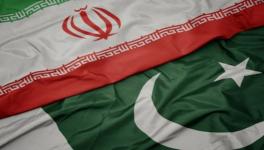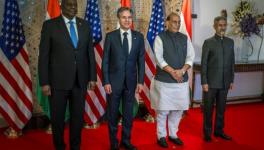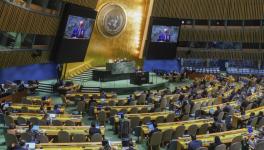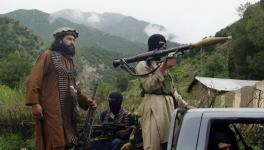Rise and Rise of Qatar in Taliban-ruled Afghanistan
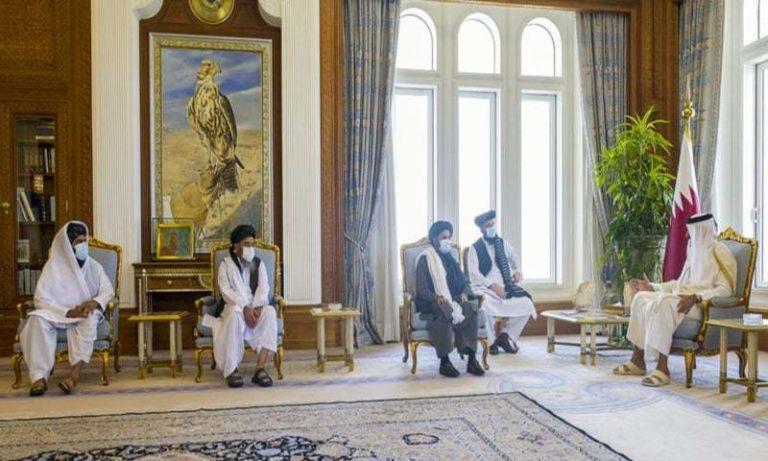
Qatar’s Emir Sheikh Tamim bin Hamad al-Thani (R) receiving Taliban co-founder Abdul Ghani Baradar (2nd-R), Doha, Sept. 2020
When the US State Department announced that it would host a virtual ministerial meeting on August 30 with “key partners on Afghanistan,” there was an element of surprise in the list of participants. Apart from the US’ NATO and EU allies, there was a solitary non-western partner country — Qatar.
What qualified this peninsular Arab country to be invited to join such a privileged circle of America’s Western allies is yet to sink in. Of course, two things come to mind at once — Doha was the venue of the US-Taliban peace talks on Afghanistan, where over 20 top Taliban leaders (with their families) took up residence in recent years, and secondly, the US Central Command, which is the staging post for all Afghan operations in future, is headquartered in Doha.
Secretary of State Antony Biden added a third thing when he announced yesterday that Washington has “suspended” the American diplomatic presence in Kabul, and “transferred our operations to Doha”, and this will soon be formally notified to Congress.
As Blinken put it, “we will use this post in Doha to manage our diplomacy with Afghanistan, including consular affairs, administering humanitarian assistance, and working with allies, partners, and regional and international stakeholders to coordinate our engagement and messaging to the Taliban.” read more
Clearly, the US is attributing importance to Qatar not only from a logistical point of view but also in political and diplomatic terms to navigate its future strategies toward Taliban-run Afghanistan. This will have far-reaching implications for Qatar, the Taliban government, US’ regional strategies and the geopolitics of West Asia.
How did Qatar get embroiled in such a risky big-power game? Of course, Qatar has a well-earned reputation for punching above its weight all across the West Asian region — ranging from Gaza to Syria, Egypt to Libya, and even to Yemen momentarily. Its enterprises were seldom successful, but that didn’t deter Qatar. Thus, although Arab Spring withered away, Qatar still provides a safe haven for Muslim Brotherhood exiles.
Being an immensely wealthy country, it has resources to spare. Although an oligarchic regime which has a host of repressive laws and silences its domestic critics, Qatar has been remarkably successful in promoting itself as a beacon of openness in a repressive region and as a haven to those fleeing Arab despots. Its ingenuity in creating Al Jazeera was a masterstroke — the popular Arab satellite station that broadcasts opinions suppressed elsewhere in the Middle East.
The Qatari calculus poses a daunting challenge for the two powerful Arab autocracies, Saudi Arabia and the UAE. The spectre of the Brothers haunts them, and indeed, by its strategic defiance, Qatar conveys a loud message of a polycentric regional order in West Asia. Indeed, the eclectic nature of Qatari regional policies gives it a larger-than-life presence in diverse situations such as Saudi Arabia and the UAE’s rivalries with Iran and Turkey.
Thus, Qatar’s dalliance with the Taliban is not to be seen as an exotic infatuation. Qatar nurtured the relationship with cool deliberation. Actually, it is already a decade-old relationship already when Taliban representatives secretly arrived in Qatar circa 2010 to talk to Western officials. read more
Crucially, it can be traced to the Taliban’s estrangement from Saudi Arabia and the UAE. As the Taliban reflected over its mistakes in the 1990s and repackaged itself, it realised that much of the opprobrium that it had earned while in power in Kabul had been due to the regime’s excessive dependence on Saudi Arabia and the UAE (which were the only two countries that recognised the Taliban government, other than Pakistan.)
Such excessive dependence led to the Taliban adopting the Wahabbi traits although those were antithetical to the traditional (Deobandi) Islam practised in Afghanistan. The austere intolerant Salafi doctrine enveloped the Taliban regime’s practice of Shariah. In turn, the Saudi intelligence had a field day in Afghanistan during the Taliban regime, using the country as a springboard to destabilise Iran. Tehran probably began doubting much later whether it was indeed the Taliban who took away the 11 Iranian diplomats from the Consulate in Mazar-i-Sharif in August 1999 (who remain untraced even today.)
At any rate, Iran does not blame the Taliban publicly anymore. It is useful to remember that the viscerally anti-Iranian Saudi prince Turki bin Faisal al Saud, friend of Osama bin Laden, headed the Al Mukhabarat Al A’amah (General Intelligence Directorate) — Saudi intelligence agency — for 23 years from 1979 until just ten days before the 9/11 attacks in 2001.
Perhaps, the Trump administration might have preferred Saudi Arabia to host the Taliban talks, but the Taliban-Saudi rupture put paid to it. In fact, such an idea again cropped up in 2020 at President Ashraf Ghani’s instance but Taliban rejected the idea, possibly with the concurrence of Pakistan whose own ties with Saudi Arabia are unstable lately. read more
Trust Qatar to make use of such a windfall to play a key role in the US-Taliban discourses. Qatar generously hosted the senior Taliban officials and a relationship began, which will stand Doha in good stead.
What remains to be seen is how far the Taliban became susceptible to the Muslim Brotherhood leaders who too have had a hospitable base in Qatar for over a decade. The Brothers, certainly, have set an example for grassroots work to integrate with the society and have had no problems with Muslim women working or getting educated. There are some indications that the Taliban are on the cusp of change.
Meanwhile, Turkey hopes to use Qatar’s good offices to build ties with the Taliban government. Turkey sought to represent the US and NATO interests at Kabul Airport even after the US troops’ withdrawal. But Taliban demanded that Turkey should vacate troops by August 31.
That was a wise decision. Turkey has a dubious reputation to deploy troops in foreign countries on some pretext and to make it open-ended as time passes. Iraq, Syria, Libya, Azerbaijan are current examples.
However, the Taliban is reportedly open to civilians from Qatar managing the Kabul Airport. Turkey, though, has still not given up hope. How this pans out will show which way the winds are blowing. Saudi Arabia and the UAE vacated their Missions in Kabul. In sum, Qatar becomes one of the Taliban’s three main Islamic partners, the others being Pakistan and Iran.
Having said that, Qatar will have to be sensitive about Pakistan’s ambitions to preserve its projection of power into Taliban-ruled Afghanistan. Pakistan may not be liking that it has been bypassed by the Biden Administration as the US’s key partner in Afghanistan. President Biden personally spoke with the Emir of Qatar Tamim bin Hamad Al Thani on August 20 and “thanked the Amir for the important role Qatar has long played to facilitate intra-Afghanistan talks.”
“The two leaders underscored the importance of continued close coordination on developments in Afghanistan and the broader Middle East”, the White House readout said. But Biden is yet to have a phone conversation with Pakistani Prime Minister Imran Khan.
Qatar is positioning itself to play a big role in the Afghan reconstruction. Conceivably, the western companies may operate through Qatar. The point is, Qatar has the resources, it has commitment and political will and it is well integrated into the western world. Qatar’s generous record in Gaza in rendering humanitarian assistance and in sustaining the economy in difficult conditions testifies to its capabilities.
All in all, after due deliberation, the US zeroed in on Qatar thoughtfully, no doubt, as its number one partner from the Muslim world to build bridges with the Taliban government. Qatar is not prescriptive. Yet, considering that Qatar is a trusted ally of Washington for decades, it is expected to be a steady influence on the Taliban leadership.
Share this:
Get the latest reports & analysis with people's perspective on Protests, movements & deep analytical videos, discussions of the current affairs in your Telegram app. Subscribe to NewsClick's Telegram channel & get Real-Time updates on stories, as they get published on our website.










